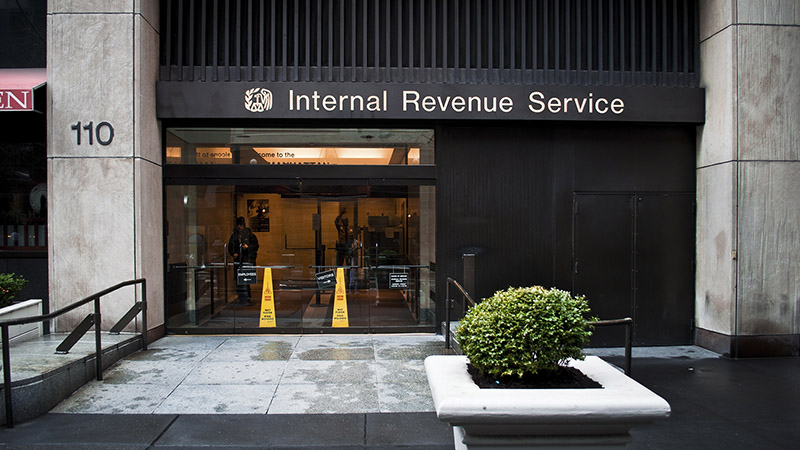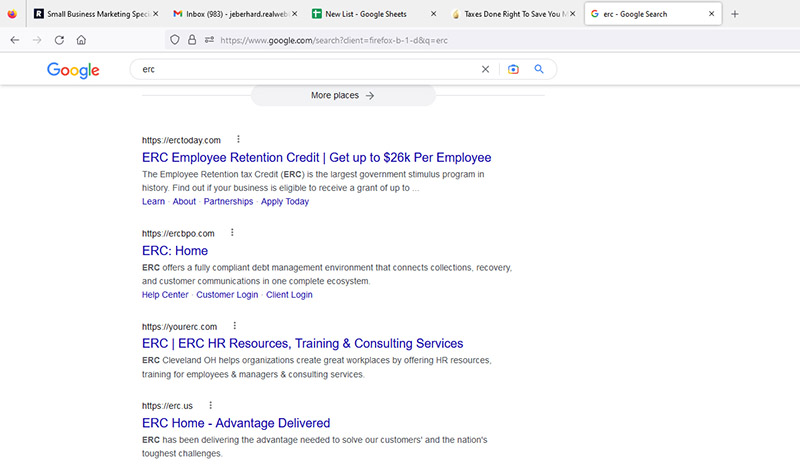By Dave Horwedel, EA
The IRS has issued a warning about improper Employee Retention Credit ERC or ERTC submissions, and has warned employers not to run afoul of the law by using unethical or untrained third parties.
I will be quoting from it shortly and will also provide a link to the IRS website so you can read it yourself. You can also order a free ERC ebook, or a free consultation, so you will understand your options.
If you were an employer in 2020 or 2021, you could receive up to $26,000 per employee, so pay attention.
Getting an ERC that you do not qualify for can destroy your business. Failing to apply for an ERC can result in your business limping along or failing for no reason. Correctly utilizing an ERC can save or expand your business.
Any business manager or owner owes it to the owners and the business to apply for the ERC if they qualify, and to not apply if they do not qualify. For most to do this will require working with a trustworthy and trained tax professional such as an EA (enrolled agent), CPA, or tax attorney. An EA, for those who do not already know this, holds the highest federal tax credential and like a tax attorney, has unlimited rights of representation before the IRS.

Here is what the IRS had to say in their ERC warning news release:
“Employers warned to be aware of third parties promoting improper employee retention credit claims. Washington: the Internal Revenue Service Today warned employers to be wary of third parties who are advising them to claim the employee retention credit (ERC) when they may not qualify.
“Some third parties are taking improper positions related to taxpayer eligibility for and computation of the credit. These third parties often charge large upfront fees or a fee that is contingent on the amount of the refund, and may not inform taxpayers that wage deductions claimed on the business’s federal income tax return must be reduced by the amount of the credit.
“If the business filed an income tax return deducting qualified wages before it filed an employment tax return claiming the credit, the business should file an amended income tax return to correct any overstated wage deduction. Businesses are encouraged to be cautious of advertised schemes and direct solicitation promising tax savings that are too good to be true. Taxpayers are always responsible for the information reported on their tax returns.
“Improperly claiming the ERC could result in taxpayers being required to repay the credit along with penalties and interest.”
OK, what do you do now? First it is great that the IRS issued this warning. It is also a bit late. Billions of dollars have already been distributed to small businessmen using third-party firms, composed in many cases of marketers and payroll tax people with no background in tax.
Getting a large ERC can be a windfall. Paying back such an ERC with penalties and interest can destroy a company.

If you apply for the ERC and are concerned your submission may have been improper, contact a reputable CPA, EA, or tax attorney firm to review your submission immediately.
You can click here for the contact data of Torchlight Tax. We’ll be glad to assist you.
For those who have not already applied for the Employee Retention Credit, due diligence should be employed in applying for the credit. The first step is working with a reputable firm.
I would like to fact check a few fallacies that have been promoted. First of all the idea that the employer does not know tax and therefore cannot know if the submission was done correctly or not, leads nowhere good. The IRS will hold YOU responsible per the above warning.
Second the idea that a marketer, entrepreneur, or payroll tax person knows more about taxes or tax law than an EA, CPA, or tax attorney is far-fetched. These are the third parties the IRS is warning about.
You can tell if you have a reputable EA, CPA or tax attorney firm or not. The first thing is to check whether they have EA or CPAs or tax attorney data on their website, on their team page. You can also check to make sure they have been in business well before the Employee Retention Credit ever came out.
Be careful of firms with “ERC” in their title. These firms may disappear when new claims disappear. Remember the last year you can file a claim for is 2021. And once the claim is filed, from that day the IRS has five years to audit you.

Now if you Google “ERC,” you will find a lot of interesting looking ERC websites. One firm of ERC “experts” had no listing of who their personnel were, no team page. Another ERC firm had just some pictures of people, like 20 people, and their names and that was it! They didn’t say “CPA,” “EA,” “tax attorney,” “payroll specialist,” “receptionist.” It was just a bunch of names of a bunch of people, and a bunch of these little pictures.
Also be leery of firms that tell you they get more refund or faster refunds. How do they do that?
Look the ERC is complex. As a law it is vague. The IRS has given a lot of guidance, but this guidance is also susceptible to court challenge.
But a veteran tax professional who knows his nomenclature can read it in a few hours. If you really dig in for every fine case, maybe 30 hours.
Now if some payroll tax specialist or marketer is telling you, you can get 10% to 20% more or get a faster refund, because his firm has a special way – How are they doing that?
The 941x that generates the refund by the way is mailed in. Now some firms may get you a refund by issuing you a loan based on your projected refund and charging you high interest. But no one has a special line to the IRS to make sure that the IRS does your return first.

Look I am prejudiced. I am an EA and my firm has used EAs, CPAs and tax attorneys since 2015 to do personal and business taxes, and to represent our clients before the IRS. We frequently have new clients who come to us because they have received an audit letter from the IRS.
We are offering a free ERC ebook for those who would like to know more about the subject. That way you can study it on your own and make sure you are comfortable.
We also have a library of ERC videos and ERC blog articles available on the Torchlight Tax YouTube channel and on the Torchlight tax website.
You are welcome to get a free consultation with an actual tax professional as well. We will do a free consultation and analysis to determine whether you are actually eligible for the ERC or not. If you are not eligible there is no fee
Click here to sign up for the free ERC ebook.
Click here to see the full IRS warning article.


